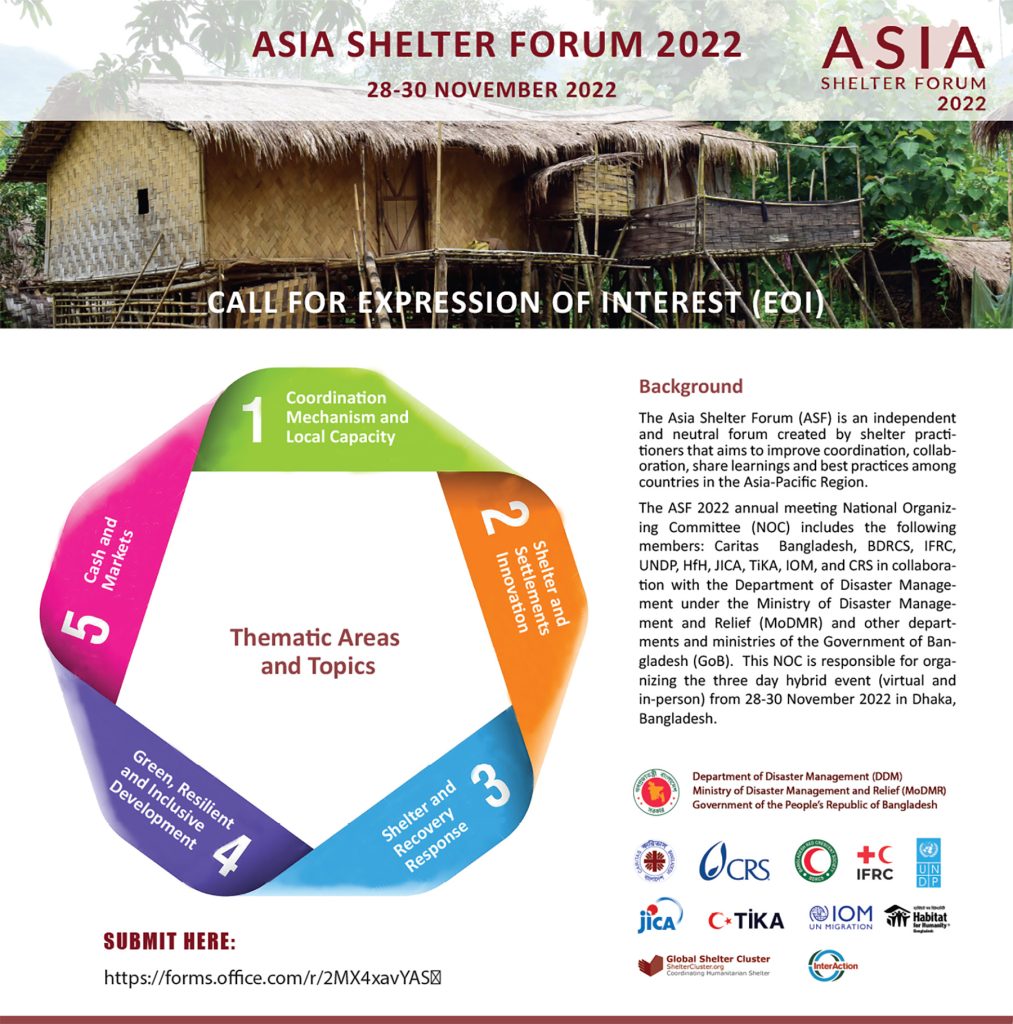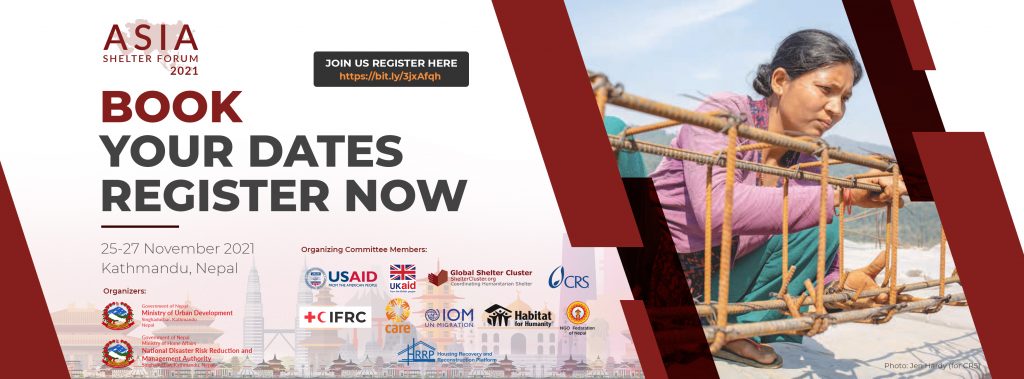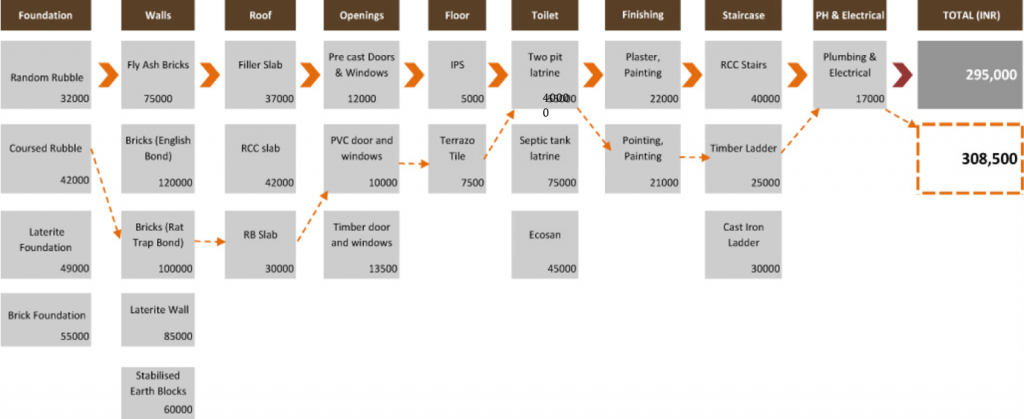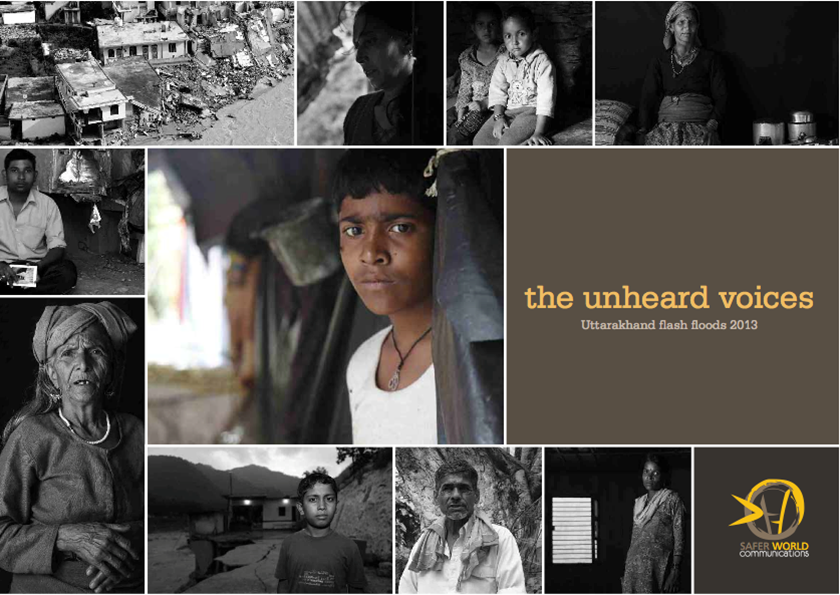The India Shelter in Emergencies Forum encourages open informal reflection on the issue of shelter in emergencies. It is hosted in rotation, with membership open to NGOs, academia and individual experts.
Category Archives: India
ASF 2022 Session Agenda
Featured
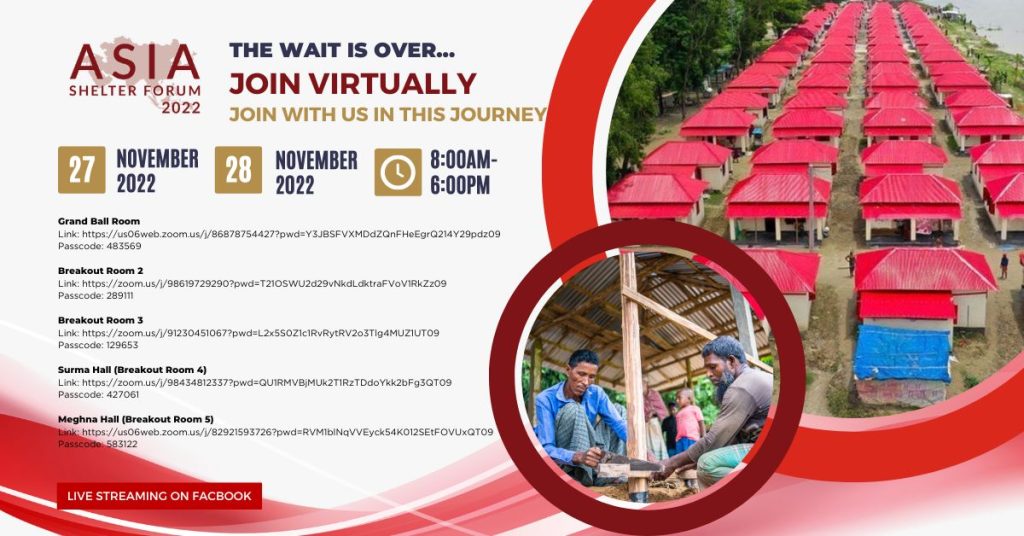
Please Find the Virtual Links to join the ASF 2022 in Dhaka Bangladesh.
Grand Ball Room
Link: https://us06web.zoom.us/j/86878754427…
Passcode: 483569
Breakout Room 2
Link: https://zoom.us/j/98619729290…
Passcode: 289111
Breakout Room 3
Link: https://zoom.us/j/91230451067…
Passcode: 129653
Surma Hall (Breakout Room 4)
Link: https://zoom.us/j/98434812337…
Passcode: 427061
Meghna Hall (Breakout Room 5)
Link: https://us06web.zoom.us/j/82921593726…
Passcode: 583122
Registration Deadline Extended for ASF 2022
Registration CLOSES on October 31, 2022!
Registration Link: https://rb.gy/zbooee
Link to Submit your EOI: https://forms.office.com/r/2MX4xavYAS
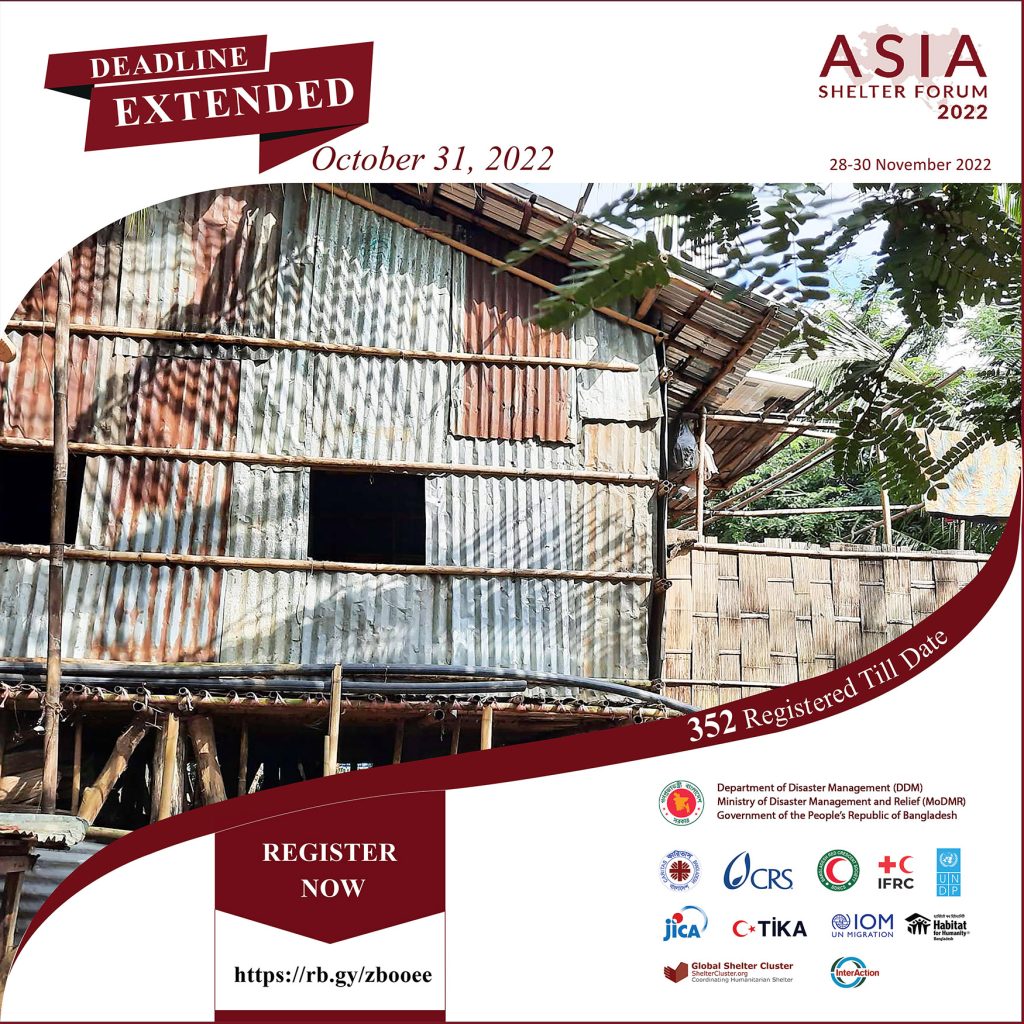
CALL FOR EXPRESSION OF INTEREST (EOI) for ASIA SHELTER FORUM 2022
India National Conference on Shelter in Emergencies: Challenges & Opportunities
On February 25th, 2016, The National Conference on “Shelter in Emergencies” was organised by CARE INDIA with support from Christian Aid and Sphere India. The conference, held in New Delhi, facilitated the process of exchange of experiences and lessons learned, as well as discussion of challenges encountered in implementing shelter projects in Indian context among a wide range of stakeholders. The conference was organised to disseminate the findings of the shelter study recently concluded by CARE INDIA, and provided a forum to share experiences from the past on shelter in post-humanitarian crisis. The key objective of the conference was to develop a consensus around strategy for shelters in future emergencies in India and the region.
Mr. Rajeev Sadanandan, Joint Secretary, Rural Housing, Ministry of Rural Development was the Chief Guest for the event. The other eminent dignitaries who attended the conference were Dr.Ashok Khosla, Chairman, Development Alternatives, Mr. Vinod Sharma, Honourable Vice Chairman, Sikkim Disaster Management Authority and Eminent
professor at Indian Institute of Public Administration and Mr. Ajit Chaudhari, General Manager, Tata Sons. The conference was also participated by well-known shelter experts across the states as well as various international and national NGOs, International donors and UN agencies.
Workshop proceedings were conducted through a series of technical sessions, focusing on the various aspects of shelter construction like sharing of national experiences; capacity-building initiatives; best practices; emerging challenges and future directions for shelter response in India. Each of the technical sessions comprised of thematic presentations by programme stakeholders and experts followed by open discussions. Going beyond experiences related to the shelter projects, this knowledge sharing initiative also focused on key technical aspects of shelter reconstruction such as disaster risk assessment, disaster-resistant construction, retrofitting, regulatory mechanisms such as building codes and by-laws, use of sustainable construction materials, capacity
building of construction fraternity and role of community participation.
Some of the key take points which emerged from the deliberations during the conference were as follows:
- The shelter is not merely a single entity. Habitation and Habitat should go hand in hand. It is important to understand whom we are building for and balance between structural, environmental and social principles.There should be a much broader discussion with more focus on various sectoral interventions (water, sanitation,
hygiene, health, environment, energy and livelihood) to ensure sustainability of shelter interventions and programmes. - Community participation and addressing the differential needs of women is an important priority in shelter programming. It is also a must to bring in the community in the purview of the shelter construction process to give them complete ownership and accountability of their shelters.
- Coordination is the key to successful implementation of any shelter programme and it is necessary to deliberate on ways to effectively coordinate with stakeholders.
- Post-disaster shelter reconstruction should incorporate disaster-resistant features. The focus should be on expanding the existing knowledge base and use of time-tested methods on one hand as well as continuous modernisation of the working methods and adoption of new and innovative technologies and construction
materials. - Since housing reconstruction is an important component in any disaster recovery programme disaster, institutions involved in disaster management and shelter construction at the national level should take a leading role to access global knowledge and learnings.
- Effective governance has a critical role to ensure proper implementation of shelter programmes. It is important that the government define a clear strategy underlining the role of each stakeholder.
- The role of NGOs needs to be more focused on ensuring equitable delivery to the most vulnerable and less about the delivery of infrastructure and housing at a large scale.
- There is a need to promote increased use of cash vouchers in shelter projects as it is faster and more flexible in meeting the needs of the affected population. This has other benefits too such as increased accountability,contributing to the local economy, and community livelihoods.
The full conference proceedings can be downloaded here: Report-National Conference on Shelter in Emergencies.
India shelter conference
On the 25th of February in Delhi there will be a one day conference to discuss the findings and recommendations of CARE and Christian Aid’s studies into the longer-term outcomes of post-disaster shelter projects in India.
Concept note – dissemination of shelter study – Feb 09
Further information on the outcomes, and copies of the study report, will be posted here in due course.
March 2014 Update
As part of the 14th UK Shelter Forum in March 2014 Anshu Sharma, SaferWorld Communications, presented an update from the India Shelter in Emergencies Forum. You can download Anshu’s presentation (which includes audio if you watch the slideshow) here.
In September 2013 members of the India Shelter in Emergencies Forum had been working on a joint assessment following the Uttarakhand flash flooding in northern India. Following this assessment SaferWorld Communications undertook additional research to fill gaps identified in the assessment. Key findings from this research were then documented in a report and exhibition later in the year.
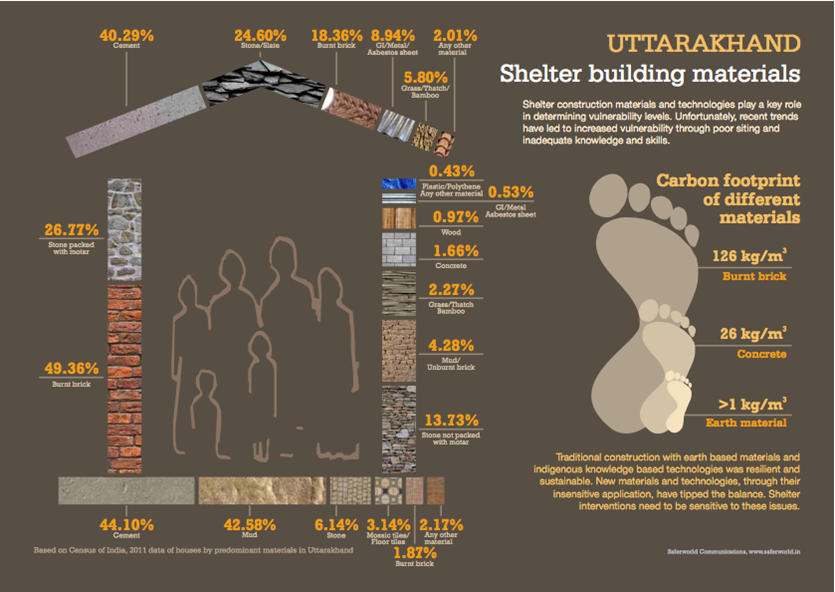 Anshu then described an innovative programme being undertaken following cyclone Phailin in October 2013. With limited funding for humanitarian organisations (due to the low number of fatalities) SaferWorld Communications are currently focused on engaging with the large-scale government/World Bank permanent reconstruction programmes. Through this they have developed a ‘menu’ of options (see below) from which families can make their own decisions regarding different components of their house. This enables families to choose higher specifications on certain items – for example they might prefer a concrete roof – while managing the overall cost of their house and ensuring safety and sustainability.
Anshu then described an innovative programme being undertaken following cyclone Phailin in October 2013. With limited funding for humanitarian organisations (due to the low number of fatalities) SaferWorld Communications are currently focused on engaging with the large-scale government/World Bank permanent reconstruction programmes. Through this they have developed a ‘menu’ of options (see below) from which families can make their own decisions regarding different components of their house. This enables families to choose higher specifications on certain items – for example they might prefer a concrete roof – while managing the overall cost of their house and ensuring safety and sustainability.
Upcoming activities of the India Shelter in Emergencies Forum include a pre-monsoon meeting hosted by Christian Aid in April 2014, engagement with architectural and planning schools, and brainstorming how to tackle key emerging challenges and trends.
September 2013 Update
As part of the 13th UK Shelter Forum in September 2013 Ram Kishan, Christian Aid presented an update from the India Shelter in Emergencies Forum and a report from SaferWorld Communications into the Uttarakhand Floods.

